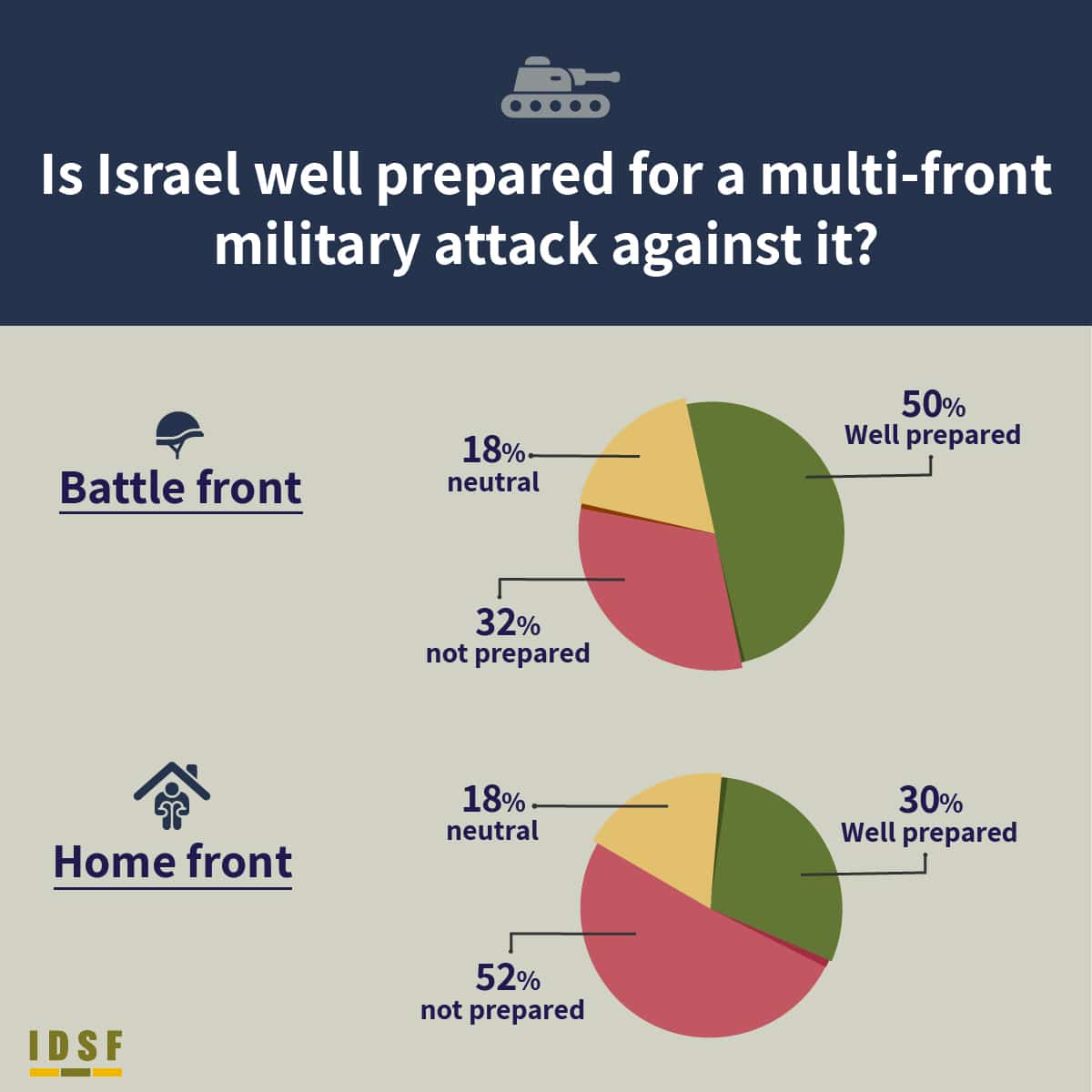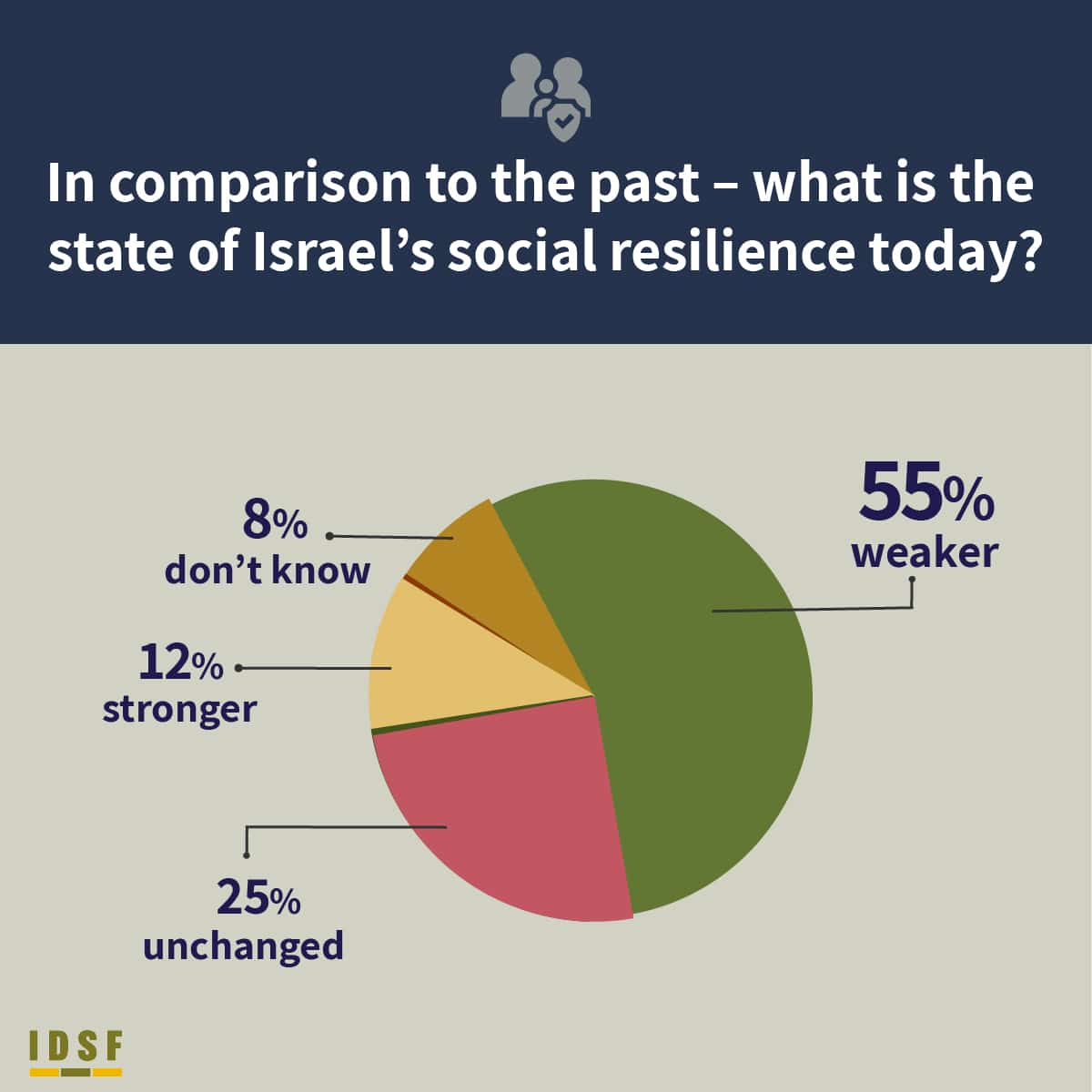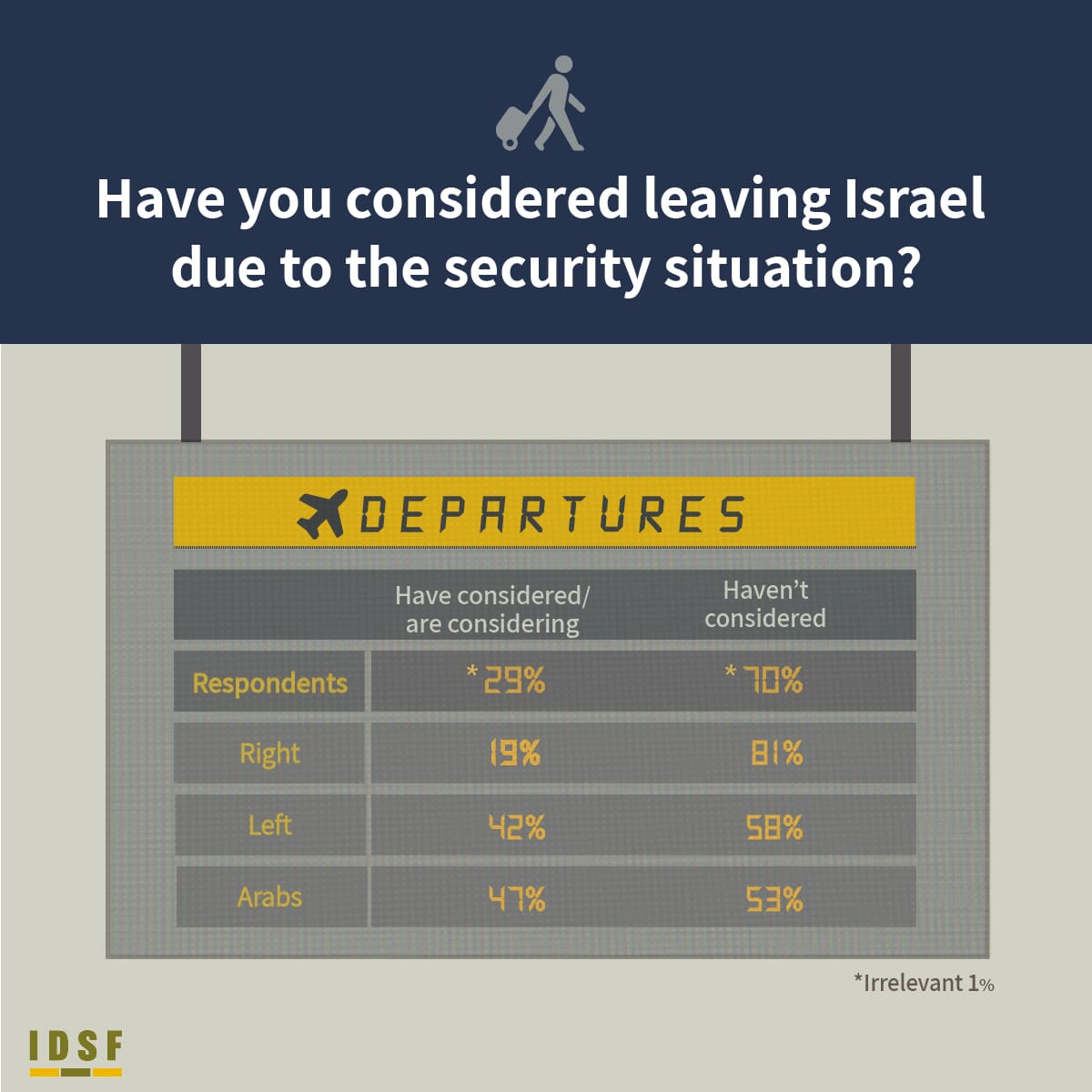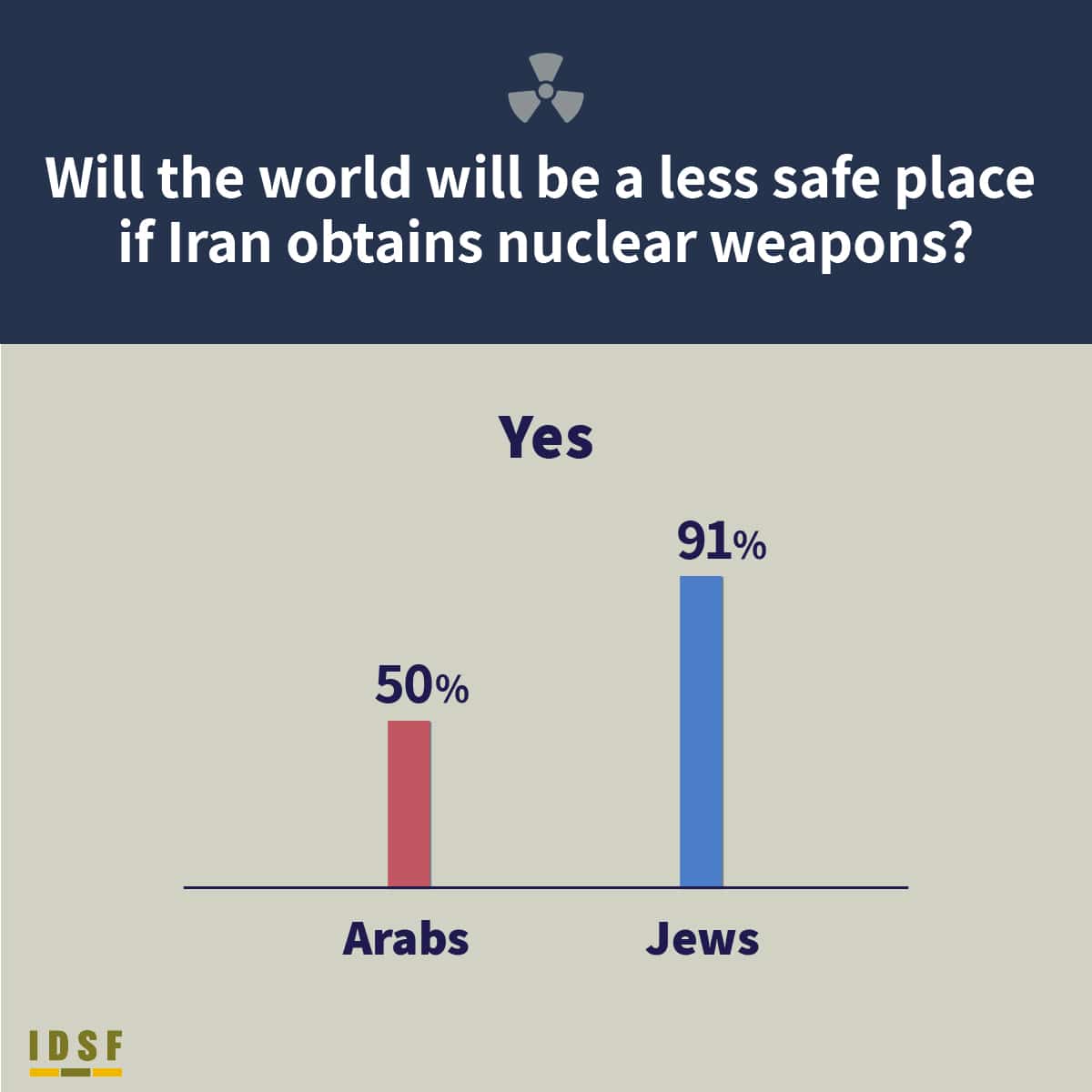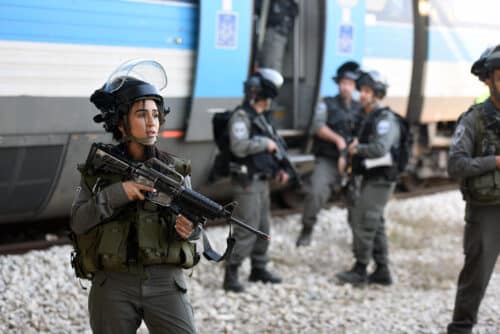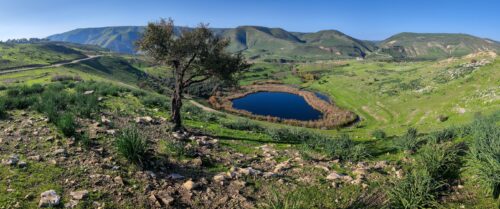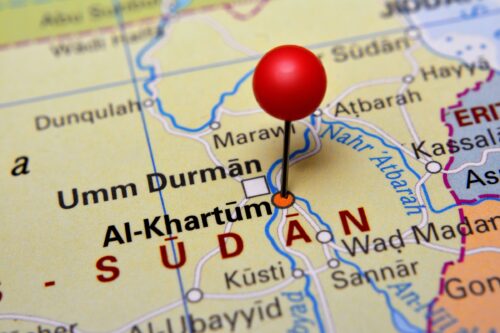The IDSF continues its opinion survey of Israeli society, on matters of Zionism, security and society. This paper presents an overview of the second part of the IDSF survey, held in the second quarter of 2022, dealing, among others, with the resilience of Israel’s society in the face of the security threats it faces. The review of the survey’s first part – which examined the Israeli public’s sentiments on the ways in which military campaigns should be decisively fought and won and on the relations between the military and government – is available in the following link.
The IDSF survey is conducted by the IDSF research division, with the statistical support of Dr. Haggai Elkayam. The survey included 1,232 participants from among Israel’s internet-using adult population. The survey’s Jewish participants sample (1,032 respondents) has a maximum margin error of ±3.05%, with a 95% probability; the Arab participants sample (200 respondents) has a maximum margin error of ±6.93% with a 95% probability; the combined sample (1,232 respondents), has a maximum margin error of ±2.79% with a probability of 95%.
Is Israel Prepared for a large-scale military engagement? Disconcerting responses
One needn’t be a military expert to acknowledge the fact that Israel’s next military engagement will involve concerted attacks on its battlefront and home front. We’ve had a small taste of this scenario in May 2021, when Israel was attacked from the Gaza borders as well as from within mixed cities. A confrontation that involves Lebanon, Syria and Iran is expected to be tenfold more challenging for the country.
Does Israel’s public feel that the country is well prepared to deal with a challenge of this magnitude? The responses we have received were less than encouraging, to say the least: only 50% of the population in Israel feel that the battlefront is properly prepared for a comprehensive military engagement, while in terms of the level of preparedness of the home front – the statistics are even more dismal with only 30% of the population believing that the home front is adequately prepared for a comprehensive military engagement.
A segmentation of the above data by ideological affiliation reveals that with regard to the public’s perceived preparedness of the home front, there is a cohesiveness across the political map; however, in terms of preparedness of the battlefront – respondents who were on the left and center of the political map were more convinced of Israel’s preparedness (65%) as compared with right-wing respondents (47%) who hold that opinion.
Professional arguments regarding the IDF and Home Front Command’s preparedness for a large-scale military engagement could be voiced, and the point can be made that the Israeli public lacks the necessary tools to appreciate the real picture as it is fully disclosed to decision-makers. Nonetheless, the indisputable public sentiment is that Israel is not fully prepared for a military confrontation – both on its battlefront and particularly on its home front.
Our research department will explore this issue in-depth during the upcoming year and will examine the state of preparedness de facto within the country’s local municipalities and of its security forces.
The public perception of Israel’s resilience: chasm between right and left
Throughout its existence, the State of Israel has known wars, military engagements, and covert operations within and outside its borders. Its military prowess depends not only on the ability of its security forces to operate in the field, but also on the resilience of Israeli society as a whole. Has this crucial resilience been eroded or does it still stand strong?
The survey shows that 55% of the Israelis view a decline in the country’s social resilience, while 25% believe it remains as strong as ever, and 12% of respondents thought that it has grown stronger (8% of respondents provided a “don’t know” response).
A national-level segmentation of the responses does not indicate notable disparities between Jews and Arabs on this issue; however, a segmentation according to political affiliation reveals significant differences: while 66% of right-wing respondents felt there is a decline in the national resilience, only 40% of left-wing respondents agreed with this statement. Another major disparity between the left and right was the response to the statement “There must not be a restriction on waving the Israeli flag around the country, even at the price of offending sensibilities of certain groups within Israeli society”: 95% of the respondents affiliated with the political right agreed with the statement while only 57% from the left agreed with it.
The disparities between right and left are also evident insofar as the respondents’ inclination of leaving the country. According to the survey, 70% of Israelis have never considered leaving, while 29% have considered doing so in the past or are presently considering leaving. An ideological segmentation reveals that while 81% of the respondents affiliated with the political right have never considered leaving Israel (with 19% having considered in the past or are currently considering doing so) – only 58% of the respondents affiliated with the left have never considered leaving the country (with 42% having considered in the past or are currently considering doing so).
Another statement that demonstrates the chasm between the political right and left is evident in the perception of media coverage of military operations – 91% of the respondents affiliated with the right agreed with the statement “whenever possible, and if doing so does not create misinformation – the media should report on military engagements from a favorable standpoint towards Israel and its security forces”; however, only 44% of the respondents affiliated with the political left agreed with the statement.
Whatever the causes of these disparities between left and right, we believe that a state of affairs wherein crucial portions of Israeli society do not feel a strong connection with the country and its symbols, and lack basic conviction in the justness of Israel’s cause – directly compromises the security of the State.
The Iranian Threat and the Israeli Arabs: Alarming Situation
The west knows: a nuclear Iran is a threat not only to Israel – but to the entire world. But what is the perception among Israel’s public on this issue? The findings of the IDSF survey reveal significant disparities between Israel’s Jewish and Arab populations.
Among the Jewish population, public opinion is unequivocal – across religious persuasion, gender and political affiliation – and in line with the Western world: 91% of Israeli Jews agree with the statement “The world will be a less safe place if Iran has a nuclear weapon”.
However, only 50% of the Israeli Arabs believe that the world will become less safe in the event that Iran obtains a nuclear bomb. In other words, there are over one million citizens of Israel who do not acknowledge the threat presented by a country that holds nuclear capabilities and openly calls for the annihilation of the State of Israel. It goes without saying that this disparity impacts our national and social resilience against threats to Israel’s security.
The Nation Is Signaling to its Leaders: There is a Problem that Demands Addressing
The above findings clearly show that the Israeli public does not feel that the country is well-prepared for the next large-scale war – neither in its battlefront nor its home front. Furthermore, the public feels that Israel’s resilience has declined in comparison to the past – a trend that is reflected, among others, in the higher rates of people who have considered or are considering leaving the country.
Brig. Gen. (res.) Amir Avivi, Chairman of the IDSF, is concerned about the results of the survey, but is determined to act in order to change the situation: “Without a sense of national cohesiveness, and high national and social resilience, we will not be able to win the next military campaigns. That is why we invest a considerable effort in strengthening national consciousness and cohesion by sounding a clear Zionist voice in the media, by promoting values of solidarity and resilience in the education system, and by working alongside decision makers. I believe in the people of Israel, and I am confident that the situation can be changed.”

